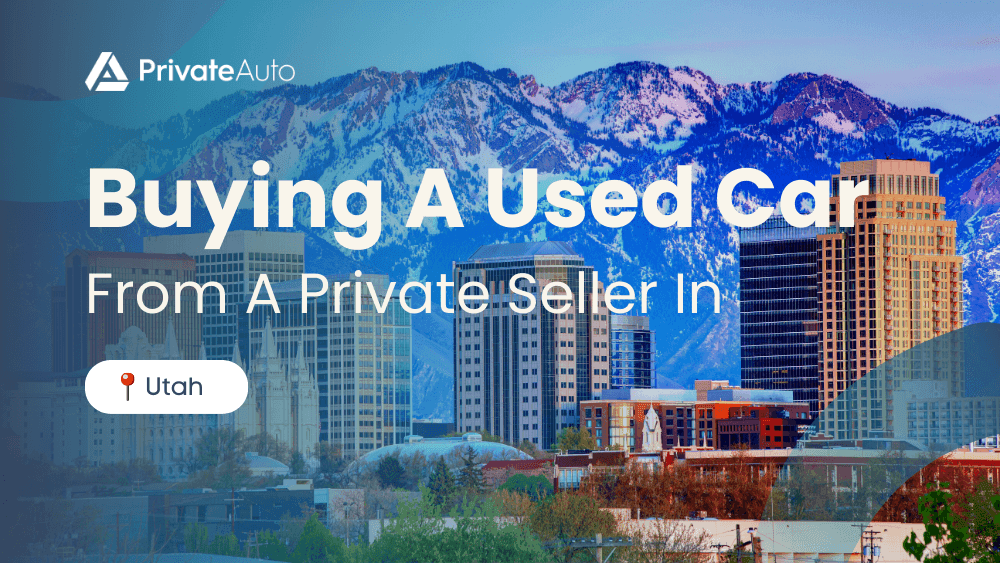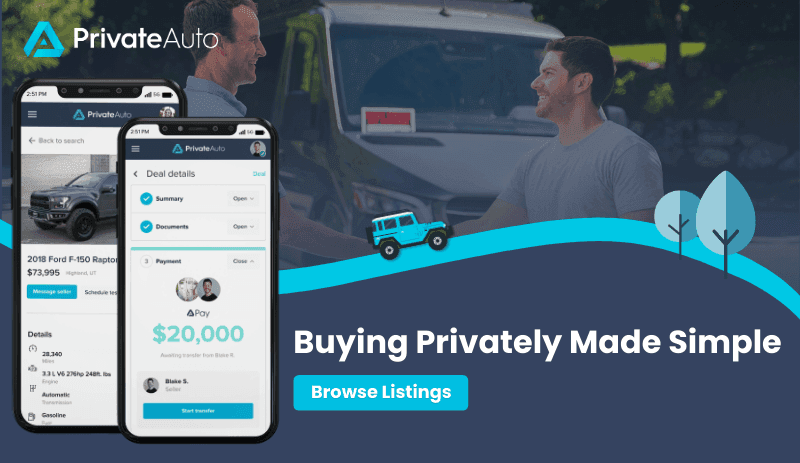Buying a Used Car from a Private Seller in Utah
If you're buying a used car from a private seller, good for you. You get a better deal when you skip the dealership and go directly to the private owner. But there are a few things you'll need to know about the process in the state of Utah.
When you purchase a vehicle from a private party, you’ll need to handle some things that a dealership normally takes care of. PrivateAuto makes the pre-owned vehicle buying experience as smooth as a dealership transaction.
Find a Car
Your first order of business is to scope out cars matching your budget, must-haves, and preferences.
Here are some of your options for finding a used car online:
a. Local classifieds like KSL Cars.
b. National classifieds such as OfferUp.
These websites can be great a resource for finding your dream vehicle, but they fall short when it comes to the actual transaction. That’s why we call them “meetingplaces” instead of marketplaces.
PrivateAuto is the only transactional marketplace that offers self-serve technology solutions for every part of the deal. If you’d like to see how easy it can be, shop our used vehicles for sale and start the car buying journey.
Even though PrivateAuto is the best car-buying app ever, we don’t hate other listing sites. That’s why DealNow was created, a fast-track deal flow that allows you to start a deal on another platform and finish it with our transactional infrastructure.
Get your deal started now!
Here are some of your options for finding a used car online:
•
Social media listings (e.g., cars for sale on Facebook Marketplace).
•
Online classifieds
b. National classifieds such as OfferUp.
•
Vehicle listing sites such as Autotrader.
•
Auction websites such as eBay Motors and Bring a Trailer.
These websites can be great a resource for finding your dream vehicle, but they fall short when it comes to the actual transaction. That’s why we call them “meetingplaces” instead of marketplaces.
PrivateAuto is the only transactional marketplace that offers self-serve technology solutions for every part of the deal. If you’d like to see how easy it can be, shop our used vehicles for sale and start the car buying journey.
Even though PrivateAuto is the best car-buying app ever, we don’t hate other listing sites. That’s why DealNow was created, a fast-track deal flow that allows you to start a deal on another platform and finish it with our transactional infrastructure.
Get your deal started now!
Negotiate the Price
You want to get the very best car for your budget. PrivateAuto allows you to make offers on cars. You never know if the owner will accept less than their initial sale price until you try.
Other websites require you to message the seller and have a potentially awkward exchange. PrivateAuto lets you make an offer with the click of a button. The seller can then accept, reject, or submit a counteroffer.
Other websites require you to message the seller and have a potentially awkward exchange. PrivateAuto lets you make an offer with the click of a button. The seller can then accept, reject, or submit a counteroffer.
Research the Car
A smart buyer wants to know everything about the car they’re getting. The two best ways to learn about a vehicle’s background are with a vehicle history report and researching the car’s title.
Research the Title
Before you move forward with a vehicle purchase, do some preliminary research on the car title.
The National Insurance Crime Bureau website allows you to research the title of any car. You might just avoid being the next victim of some car scam.
Good title research will help you check for:
1. Reports of the car having been stolen.
2. The car having been declared a total loss in an insurance claim.
3. An outstanding lien (or lien release).
Ask the seller for their full name and the vehicle identification number (VIN). Run the title check, and have one less thing to worry about.
The National Insurance Crime Bureau website allows you to research the title of any car. You might just avoid being the next victim of some car scam.
Good title research will help you check for:
1. Reports of the car having been stolen.
2. The car having been declared a total loss in an insurance claim.
3. An outstanding lien (or lien release).
Ask the seller for their full name and the vehicle identification number (VIN). Run the title check, and have one less thing to worry about.
Vehicle History Report
A vehicle history report is always a good idea when buying a used car. It covers ownership history and maintenance records and shows how well the seller cared for their car.
PrivateAuto provides a vehicle history report for all premium listings.
Here are some reasons a vehicle history report helps you have one less thing to worry about.
1. You know how well the car has been cared for.
2. You are aware of any accidents or insurance claims.
3. You can see service records, major repairs, and other work that has been done.
PrivateAuto provides a vehicle history report for all premium listings.
Here are some reasons a vehicle history report helps you have one less thing to worry about.
1. You know how well the car has been cared for.
2. You are aware of any accidents or insurance claims.
3. You can see service records, major repairs, and other work that has been done.
Go for a Test Drive
Unless you’re buying a car remotely, you’re going to want to test-drive it personally.
PrivateAuto lets you arrange the test drive in a safe, easy, and convenient manner that protects your personal information.
1. You can choose to transact with verified sellers, which helps to weed out scammers and crooks who want to conceal their identity.
2. Our in-app scheduler allows you to pick from the time slots the seller has chosen. No awkward back-and-forth conversations. You'll also see the seller's preferred meetup location.
You’ll schedule the test drive in seconds without ever needing to communicate with the seller.
PrivateAuto lets you arrange the test drive in a safe, easy, and convenient manner that protects your personal information.
1. You can choose to transact with verified sellers, which helps to weed out scammers and crooks who want to conceal their identity.
2. Our in-app scheduler allows you to pick from the time slots the seller has chosen. No awkward back-and-forth conversations. You'll also see the seller's preferred meetup location.
You’ll schedule the test drive in seconds without ever needing to communicate with the seller.
Documentation
You’ve test-driven the car and you’re ready to buy. It’s time to handle the paperwork. Here are the key documents involved in a private-party vehicle transaction in the state of Utah.
1. Certificate of title
2. Emissions testing
3. Bill of sale
1. Certificate of title
2. Emissions testing
3. Bill of sale
Utah Certificate of Title
A Utah title certificate requires both you and the seller to fill in the following information at the time of the sale:
•
Odometer disclosure
•
Date of sale
•
Purchase price
•
Your hand-printed name and signature
•
Seller’s hand-printed name, signature, and address (if there is more than one seller listed on the title, all sellers will need to sign)
Utah Emissions Testing
Utah takes clean air seriously and requires emissions testing to make sure that your car meets state and federal emissions standards.
The following counties require emissions testing:
1. Salt Lake County
2. Davis County
3. Utah County
4. Weber County
5. Cache County
To find out more about the details and see if your vehicle requires testing, visit the official Utah DMV website.
The following counties require emissions testing:
1. Salt Lake County
2. Davis County
3. Utah County
4. Weber County
5. Cache County
To find out more about the details and see if your vehicle requires testing, visit the official Utah DMV website.
Utah Bill of Sale
While Utah doesn't require a bill of sale, we recommend you always complete one with the seller. This document protects you by memorializing the terms of the sale, the VIN, the selling price, mileage, and the names and signatures of both parties. If the seller ever wants to contest the transaction or any part of it, you have their signature on a legal document with all of the terms and details to back you up.
PrivateAuto makes it easy with an official Utah bill of sale in the mobile app. Both you and the seller review the details and then digitally sign after inspecting the car. No scanning or printing is needed. Everything is stored in your account as a reference.
PrivateAuto makes it easy with an official Utah bill of sale in the mobile app. Both you and the seller review the details and then digitally sign after inspecting the car. No scanning or printing is needed. Everything is stored in your account as a reference.
Pay for the Car
There weren't many great ways to pay for a car—until PrivateAuto arrived on the scene.
We got tired of the limitations of existing payment methods, so we created PrivateAuto Pay.
Here’s how it works:
1. No transfer fees.
2. No exchange of contact or banking info.
3. Instantaneous transfers. Close the deal when you meet for the test drive.
4. Works 24 hours a day, 365 days a year. No coordinating around bank hours.
5. Enjoy escrow-like safeguards without the expense and hassle of an actual escrow service.
6. Good for transfers up to $1M
•
Venmo and Zelle have low transfer limits.
•
Cash is inconvenient and risky
•
PayPal has fees.
•
Checks and wire transfers are slow and unwieldy.
We got tired of the limitations of existing payment methods, so we created PrivateAuto Pay.
Here’s how it works:
1. No transfer fees.
2. No exchange of contact or banking info.
3. Instantaneous transfers. Close the deal when you meet for the test drive.
4. Works 24 hours a day, 365 days a year. No coordinating around bank hours.
5. Enjoy escrow-like safeguards without the expense and hassle of an actual escrow service.
6. Good for transfers up to $1M
Utah Title Transfer and Registration
After the seller has signed over the title, you’ll go to a Utah Division of Motor Vehicles (DMV) office to complete the title transfer process. At the same time, you’ll register the vehicle in your name, get new license plates, and pay the associated Utah vehicle sales tax.
Here’s what you’ll need to provide when you visit your local DMV office:
Read our complete guide to a Utah title transfer for more info on the subject.
Here’s what you’ll need to provide when you visit your local DMV office:
•
The Certificate of Title, signed over to you by the previous registered owner
•
A completed Vehicle Application for Utah Title (Form TC-656)
•
Lien information (if applicable)
•
Payment for the Utah sales tax: 4.85% of the vehicle’s purchase price
•
Payment for Utah’s vehicle title transfer fee: $6
•
Payment for Utah registration fees: from $10 to $150 depending on the age and type of vehicle
•
Payment for Utah license plates: $12
•
Valid ID or driver's license
•
Proof of insurance
Read our complete guide to a Utah title transfer for more info on the subject.
Should I Buy from a Dealer or a Private Seller?
Traditionally, dealerships have offered more convenience, while private sales have offered better value.
Here at PrivateAuto, we’re big fans of the private seller route. Here are the advantages:
1. Get a better price by cutting out the middleman and going straight to the source. Dealers must buy low and sell high to make a profit and keep the lights on.
2. Avoid fees. Car dealers charge documentation fees that range from $50 to over $1,000.
3. You drive the deal on your terms. PrivateAuto allows you to make offers and negotiate the best deal directly with the seller.
4. In some states, buying from a private seller means no vehicle sales tax. For example, Arizona, Hawaii, and Nevada charge sales taxes on retail (dealership) vehicle purchases, but not private-party ones.
We believe in making private-party transactions as easy as buying a used car from a dealership. That’s what we’re all about.
Here at PrivateAuto, we’re big fans of the private seller route. Here are the advantages:
1. Get a better price by cutting out the middleman and going straight to the source. Dealers must buy low and sell high to make a profit and keep the lights on.
2. Avoid fees. Car dealers charge documentation fees that range from $50 to over $1,000.
3. You drive the deal on your terms. PrivateAuto allows you to make offers and negotiate the best deal directly with the seller.
4. In some states, buying from a private seller means no vehicle sales tax. For example, Arizona, Hawaii, and Nevada charge sales taxes on retail (dealership) vehicle purchases, but not private-party ones.
We believe in making private-party transactions as easy as buying a used car from a dealership. That’s what we’re all about.
Utah Vehicle FAQ
Do you pay sales tax on a used car in Utah?
Utah vehicle sales tax is assessed based on the purchase price and location where the vehicle will be registered. Sales tax has three components:
1. The 4.85% statewide rate
2. The local municipal rate
3. The county rate
For example, if you purchase a 2022 Jeep Gladiator in Park City for $45,000 you will pay:
- State sales tax: 4.85% of $45,000 = $2,182.50
- Park City municipal sales tax: 1.0% of $45,000 = $450
- Summit County sales tax: 0.25% of $45,000 = $112.50
See a complete list of all Utah city and county sales tax rates on this official resource.
1. The 4.85% statewide rate
2. The local municipal rate
3. The county rate
For example, if you purchase a 2022 Jeep Gladiator in Park City for $45,000 you will pay:
- State sales tax: 4.85% of $45,000 = $2,182.50
- Park City municipal sales tax: 1.0% of $45,000 = $450
- Summit County sales tax: 0.25% of $45,000 = $112.50
See a complete list of all Utah city and county sales tax rates on this official resource.
How much is the license plate transfer fee in Utah?
What if I want to sell my car in Utah?
How long can you drive without plates in Utah?
What kind of vehicle insurance coverage do I need to have in Utah?
What is the average price of a used car in Utah?
Further Reading

Landon Epperly
Contributing Author
Landon Epperly is the Product Manager at PrivateAuto, where he thrives on turning innovative ideas into reality. With a deep passion for cars and boats, Landon combines his love for vehicles with his expertise in product development to enhance the online marketplace experience....


